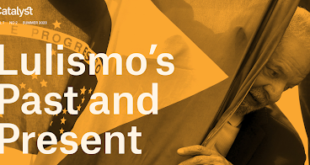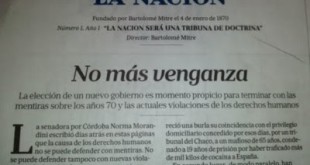Lula da Silva’s return to the presidency in Brazil has opened up the possibility of deepening democracy and expanding the scope of egalitarian advance for the Brazilian working class. In what ways might his administration pursue expansionary fiscal and redistributive policies that would improve the conditions of his political base?In the latest print issue of Catalyst, Matías Vernengo explores the historical and contemporary contours of Brazil’s political economy and outlines how the Lula...
Read More »A New Turn to the Left in Latin America?
Special issue of Cuadernos de Economía, to be co-edited by Esteban Pérez and myself. Deadline is December 15.
Read More »Is dependency over?
[embedded content]Short clip of part of an interview. I discussed that in an old paper here, and in another interview here.
Read More »A new Pink Tide in Latin America?
[embedded content]Episode 52 of the Podcast Missão Desenvolvimento with Paulo Gala and Eduardo Crespo discussing the possible new Pink Tide in Latin America (in Portuguese).
Read More »Neoliberalism in the Pampas
Soybean Republic As promised, here are some brief reflections on the situation in Argentina, which I think is not as bad as in Brazil economically or politically, surprisingly, since Argentina had a balance of payments problem that is completely absent in the increasingly chaotic neighbor, and the left actually lost the election, which was not the case of Dilma (a coup was required to defenestrate her). As I suggested in my talk a year ago (for non Spanish speakers go to this text), the...
Read More »Boycott the Rio Olympics to Defend Brazilian Democracy
By Thomas PalleyTerrible anti-democratic events are now unfolding in Brazil with the constitutional coup against President Dilma Rousseff, organized through a cooked-up impeachment trial.The impeachment coup represents a naked attempt by corrupt neoliberal elements to seize power in Brazil. Make no mistake: it is a threat to democracy and social progress in Brazil, Latin America, and even the global community at large.If Brazilian voices concur, the world should respond by boycotting the Rio...
Read More »The strange and misunderstood reasons for the Brazilian crisis
Almost done for the year. So do not expect many posts before the end of the ASSA conference (January 5). But as I promised, here are some brief thoughts on the Brazilian crisis.Brazil is a mess. The economy is collapsing, with an estimated decline of about 3.5% in GDP this year (perhaps worse), and inflation has accelerated, to two digit levels, way above what used to be the upper limit of the inflation target band. Worse, politically the country is paralyzed, with an impeachment process in...
Read More »Neoliberalism Resurgent: What to Expect in Argentina after Macri’s Victory*
The election of businessman Mauricio Macri to the presidency in Argentina signals a rightward turn in the country and, perhaps, in South America more generally. Macri, the candidate of the right-wing Compromiso para el cambio (Commitment to Change) party, defeated Buenos Aires province governor Daniel Scioli (the Peronist party candidate) in November’s runoff election, by less than 3% of the vote.Macri is the wealthy scion an Italian immigrant family that made its money on the basis of...
Read More »Right wing turn in Latin America?
No shame Slow posting during the Thanksgiving break. Just a brief follow up on my recent post on Argentina. By a relative small margin the right wing candidate, Mauricio Macri, won the election. As noted in the previous post the most dangerous result would be an attack on the human rights policies followed by the current government, that have led to jail more than 400 human rights violators (noted that several were acquitted by lack of proofs as it should happen in a civilized society; so...
Read More »The Argentinean election, the economy and more
On Sunday, November 22, Argentineans are going to the polls. The two candidates represent significantly different projects, and not just in economic terms. On the one hand, there is Daniel Scioli, governor of Buenos Aires, ex-vice-president during Néstor Kirchner’s presidency and (even if not completely trusted by those closer to President Cristina Fernández de Kirchner) the candidate of continuity. On the other hand, Mauricio Macri—wealthy scion a business family with origins as public...
Read More » Heterodox
Heterodox




